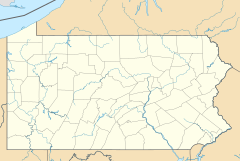
Cork is an impermeable buoyant material, the phellem layer of bark tissue that is harvested for commercial use primarily from Quercus suber, which is native to southwest Europe and northwest Africa. Cork is composed of suberin, a hydrophobic substance. Because of its impermeable, buoyant, elastic, and fire retardant properties, it is used in a variety of products, the most common of which is wine stoppers. The montado landscape of Portugal produces approximately half of cork harvested annually worldwide, with Corticeira Amorim being the leading company in the industry. Cork was examined microscopically by Robert Hooke, which led to his discovery and naming of the cell.

Lancaster, also known as the Red Rose City is a city in South Central Pennsylvania, that serves as the seat of Pennsylvania's Lancaster County and is one of the oldest inland towns in the United States. With a population at the 2020 census of 58,039, it ranks 11th in population among Pennsylvania's municipalities. The Lancaster metropolitan area population is 507,766, making it the 104th-largest metropolitan area in the U.S. and second-largest in the South Central Pennsylvania area.

A bottle cap or bottle top is a closure for the top opening of a bottle. A cap is sometimes colourfully decorated with the logo of the brand of contents. Plastic caps are used for plastic bottles, while metal with plastic backing is used for glass; plastic caps are commonly made from PE or PP, whilst metal caps are usually either steel or aluminum. Plastic caps may have a pour spout. Flip-Top caps like Flapper closures provide controlled dispensing of dry products. Caps for plastic bottles are often made of a different type of plastic from the bottle.
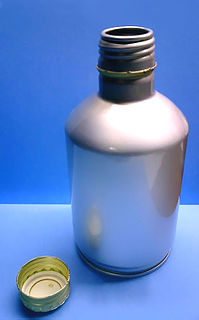
Closures are devices and techniques used to close or seal container such as a bottle, jug, jar, tube, can, etc. Closures can be a cap, cover, lid, plug, etc.
Crown Holdings, Inc., formerly Crown Cork & Seal Company, is an American company that makes metal beverage and food cans, metal aerosol containers, metal closures and specialty packing. Founded in 1892, it is headquartered in Philadelphia, Pennsylvania. As of their annual report for 2020, Crown employs 33,264 people at 192 plants in 39 countries. It claims to manufacture one out of every five beverage cans used in the world, and one out of every three food cans used in North America and Europe. The company is ranked No. 269 in the Fortune 500 list for 2021 and is number one in the packaging and container industry for the same list.
Rexam plc was a British-based multinational consumer packaging company headquartered in London, England. After spending much of its life as a paper producer known as Bowater, it diversified and became a leading manufacturer of beverage cans. It had 55 plants in over 20 countries across Asia, Europe, North America and South America. In June 2016, Rexam was acquired by Ball Corporation for $8.4 billion.

Armstrong World Industries, Inc. is a Pennsylvania corporation incorporated in 1891. It is an international designer and manufacturer of walls and ceilings. Based in Lancaster, Pennsylvania, AWI has a global manufacturing network of 26 facilities, including nine plants dedicated to its WAVE joint venture. In 2011, Armstrong's net sales were $2.86 billion, with operating income of $239.2 million.

Castle Bromwich Assembly is a factory owned by Jaguar Land Rover. It is located on the Chester Road in Castle Vale, Birmingham, England and employs 3,200 people. The plant covers an area of 110 acres, with a 60,000 m² (6-hectare) manufacturing facility. It manufactures all Jaguar saloon and sports cars.

Wine corks are a stopper used to seal wine bottles. They are typically made from cork, though synthetic materials can be used. Common alternative wine closures include screw caps and glass stoppers. 68 percent of all cork is produced for wine bottle stoppers.

Alternative wine closures are substitute closures used in the wine industry for sealing wine bottles in place of traditional cork closures. The emergence of these alternatives has grown in response to quality control efforts by winemakers to protect against "cork taint" caused by the presence of the chemical trichloroanisole (TCA).
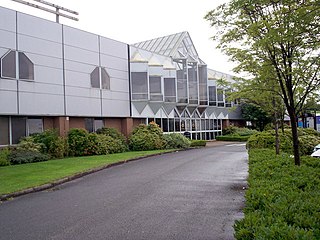
Tyrone Crystal was a crystal manufacturing company in Dungannon, County Tyrone in Northern Ireland.
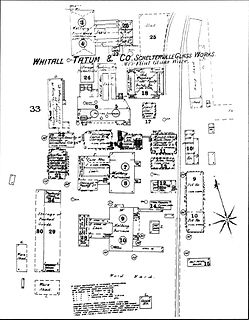
The Whitall Tatum Company or Whitall Tatum (1806–1938) was one of the first glass factories in the United States.

Chance Brothers and Company was a glassworks originally based in Spon Lane, Smethwick, West Midlands, in England. It was a leading glass manufacturer and a pioneer of British glassmaking technology.
Mannok, formerly the QUINN group, is a business group headquartered in Derrylin, County Fermanagh, Northern Ireland. The group has ventured into cement and concrete products, container glass, general insurance, radiators, plastics, hotels, and real estate. It was formed by Seán Quinn in 1973, developing from a small quarrying operation in Derrylin into a large organization, employing over 8,000 people in various locations throughout Europe.
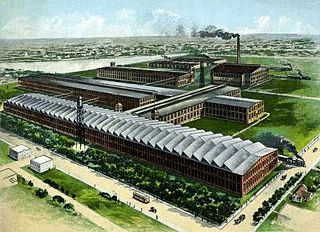
Cone Mills Corporation was a twentieth-century manufacturer of cotton fabrics that included corduroy, flannel, and denim. The company headquartered in Greensboro, North Carolina and had its factory mills in parts of North and South Carolina. The company has its roots in a family-operated Baltimore grocery business that was managed mostly by Moses H. Cone and his brother Caesar.
Brockway Glass Company was founded in 1907 in Brockway, Pennsylvania by the Brockway Machine Bottle Company. Brockway manufactured and sold glass containers and tubing along with plastic products manufactured through wholly owned subsidiaries. In 1964, Brockway bought several Hazel-Atlas Glass Company factories from the Continental Can Company as part of a lawsuit settlement. In 1987, Owens-Illinois made a bid of $60 per share to acquire Brockway, which was met with resistance by the FTC. After a Federal District Judge denied the FTC's request for an injunction, Owens-Illinois acquired Brockway's shares.

Wilton International is a multi-occupancy industrial site in Redcar, North Yorkshire, England. Originally a chemical plant, it has businesses in a variety of fields including energy generation, plastic recycling and process research.

Charles Corydon Hall was an American businessman, chemist, engineer and industrialist. He developed a process of converting molten limestone into fibers that would become an insulation material. He initiated the rock wool insulation industry in America and is considered its progenitor. Rock wool was commonly used in refrigerator insulation.
Indiana Glass Company manufactured pressed, blown and hand-molded glassware and tableware for almost 100 years. Predecessors to the company began operations in Dunkirk, Indiana, in 1896 and 1904, when East Central Indiana experienced the Indiana gas boom. The start date for the company is considered 1907, when a group of investors led by Frank W. Merry formed a company to buy the Dunkirk glass plant that belonged to the bankrupt National Glass Company. National Glass was a trust for glass tableware that originally owned 19 glass factories including the plant in Dunkirk. National Glass went bankrupt in 1907, and its assets were sold in late 1908.

The Red Caboose Motel is a 48-room train motel in the Amish country near Ronks, in Lancaster County, Pennsylvania, where guests stay in actual railroad cabooses. The motel consists of over three dozen cabooses and some other railroad cars, such as dining cars that serve as a restaurant. It was developed and opened in 1970 by Donald M. Denlinger, who started with 19 surplus cabooses bought from the Penn Central Railroad at an auction. The property has been expanded and renovated since opening. In addition to providing lodging, the motel has hosted many railroad-themed events and other concerts and dances in its barn.

